


Among the many chat-ups I receive on Facebook, recently I received a note from a chess coach in an impoverished area in the USA:
’Hi Diana, I have been a chess coach in the USA at a school in a high poverty area for several years. I was in Costa Rica in April and talked to the director of a non-profit organisation called CEPIA about creating a chess club there to help children in poverty there. I am taking an unpaid leave of absence and should be down there in early August. I have had a few posts about chess in the last few days (one about U2). There was one specifically about girls in chess. I would be interested in knowing what you think.
Thanks, Kevin Cripe’
From the conversations that ensued over the next few days, I realised that I was talking to a person greatly concerned with social ills, with strong views about their causes and ways for improvement, modestly voiced on his Facebook pages, and sometimes in the local press.

Kevin Cripe on a visit to the Holocaust memorial in Berlin: ’there was a light rain falling and it
made the cement blocks (Symbols of coffins) shine’.
Before we reach the main purpose of this article – a fundraising and a creation of a children’s chess club in Costa Rica, which is Kevin’s goal - I wish to present to our chess community a worthy teacher, a social worker and a chess coach. You can read more on his Facebook page where he expresses his thoughts regarding many facets of social life in deprived areas, but primarily, for our special interest, they address the effects of teaching chess to less fortunate children.
Kevin remembers when he first had the idea of starting a chess club as a way of easing the upbringing of children in a particularly tough area, that of Modesto, in central California, about 75 minutes from San Francisco. "I have taught at elementary schools that are 98% free and have a reduced lunch and about 80% English Language Learners (Spanish speaking). For people not from the USA that means there are all the ills you can associate with poverty right outside my school door. There are gangs , teen pregnancies, high drop-out rates and many more things which children shouldn't have to be part of. Against that I had the idea to start a chess club in my second year as a teacher. I remember as I was planning to go to the National Elementary Chess Championship in Charlotte North Carolina, a teacher at my school came up to me and said, "Don't do this, you will only embarrass these children." I have watched countless gut wrenching losses, and seen some amazing wins. I never once watched a student embarrass him or herself or her community."
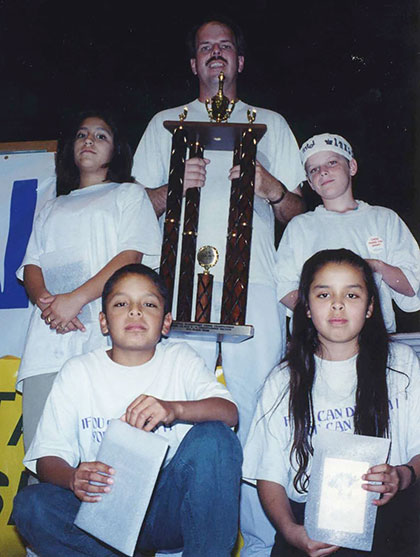
Kevin’s students, 4th place team in the 1994 Nationals K - 6 open
"What chess did for my students was to give them a chance to see the world outside south Modesto and to realize they could be part of it. Did chess make them "smarter"? I would contend they were all pretty smart to begin with. Cognitively speaking, chess may have activated some parts of their brains which hadn't had the opportunity to get a work-out but, once they saw the challenge, all their brains did what most other children's brains do."

Kevin with his students
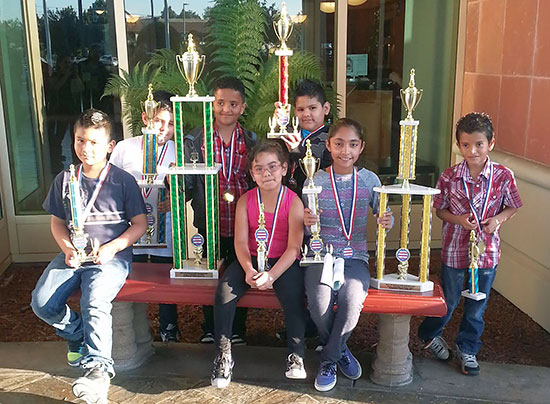
Players from Kevin’s Chess Club
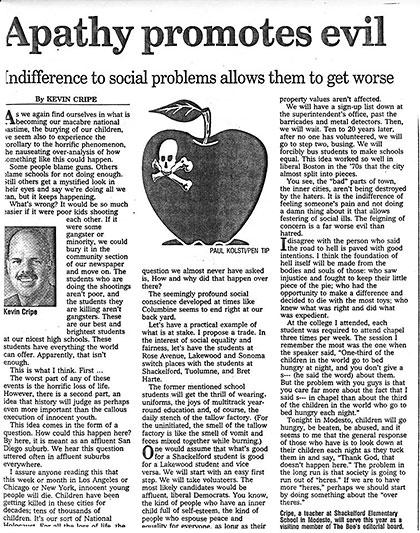
Kevin is part of a community which has seen many meaningless, inexplicable
shootings in schools and young lives lost. At the time of the Columbine
massacre he wrote an article in the local newspaper under the title: ’Apathy
Promotes Evil – Indifference to Social problems allows them to get worse’
His drive to use chess in order to make a difference in the lives of children in remote and harsh communities is inspired by his thought that ’Chess being used to create chess champions is a good thing. Chess being used as an opportunity to help children to a better future is a great thing.’ Consider the story about Liliana, a 10-year-old who, against all odds, carried out a grand winner’s cup:
"Going into the last round of a chess tournament, 10 year old Liliana was in first and all she needed to do was win or draw to get clear first in her section and win a pretty good sized trophy. She was winning and then she played a bad move, the game turned and she lost. The loss was devastating . There were tears....and more tears and it is at moments like these that you wonder, "Was this such a good idea?" Is taking young children and putting them in intensely competitive situations and watching them suffer horrific losses a good idea? What possible value could that be? This was the weekend of the U.S. Game in 60 and Game in 30 Championships and so, there would be a tournament the next day. I remember telling Liliana’s mom , "If she doesn't feel like making up to the tournament tomorrow, just let me know." I felt in my heart, I don't think she will be here tomorrow. Liliana showed up the next day and won all her games and came clear first. That 10 year old girl had something inside her which told her "Get up and keep moving toward your goal. Life won't be easy." When people ask me, "Why do your students succeed?", part of my answer is this idea: "They are as tough as nails."
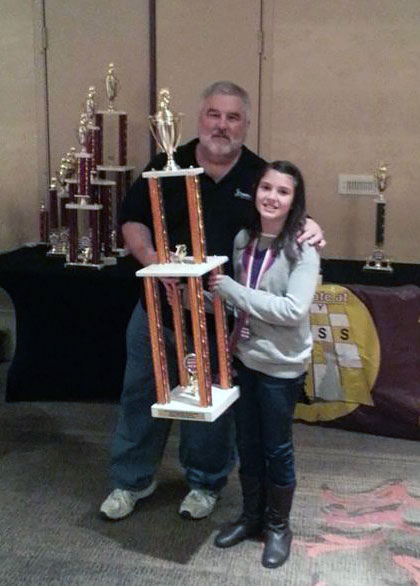
Liliana Flores with her big trophy, which would not have happened
without the previous day's 'failure'
Kevin recounts Liliana’s story along with other stories that he tells children on their first day in a chess club. He is careful to make children understand the meaning of ’winning’ and ’losing’: "When you attempt to master something, there will be failures along the way. Mistakes can hurt sometimes. Winning doesn't make you a better person and losing doesn't make you a worse person."
Kevin also touches to the problem of ’bad’ parents when it comes to pushing children to the limits and devaluing them when a failure, read a ’lost game’, occurs. He is convinced that such parental behaviour may on occasions cause a positive result but it is only temporary and it does not create a strong personality in the adult years. "Competition is a good thing. Deciding how much you value a child by how they perform in a competition is a dreadful thing. What is the single most important quality for parents of children in competitions to display? Loving the child through all outcomes. When Liliana lost, she went straight to her mothers’ arms and cried. Her mothers’ arms were there for her. We have all seen parents who yell at children and do things the wrong way and sometimes those children do "better" in the short term. How many of those children will stay in that environment when they become adults? How many people want to be near that family? Goals should be set and performance should be measured. Children like to know how they are doing and they will naturally put pressure on themselves. Every child knows winning is more fun than losing. But the people who make the most progress are the ones that know that when they lose you need to ’dust yourself off’, learn from your mistakes and realize that the people who care about you, still care no matter what happens."
From 1993 to 2001 one of the best supporters of the chess club was a lady named Ursula Foster. Ursula went to school with Anne Frank and was in hiding about a block from Anne Frank herself. She is mentioned briefly in the Diary of Anne Frank as "Ursul" .
As Kevin recounts, "I always invited Ursula to bring her star and other things from the holocaust to my class. She always gave money to the chess club and played in many tournaments we went to. We would not have been able to do anywhere near as much without her active support. To have someone with such a compelling life story come and talk about how she was singled out simply because of her religious beliefs was inspirational. My students would associate prejudice with skin color, but through her life they could see that prejudice always started with someone being different and people choosing to hate instead of understand.
During the summers of 1993, 1994 and 1995 my ex-wife and I drove students from California to Philadelphia and each year one of our stops was to see the Holocaust museum in Washington D.C.
The US Chess Federation has officially recognized Ursula Foster and her contributions, now
perpetuated through the Ursula Foster Award
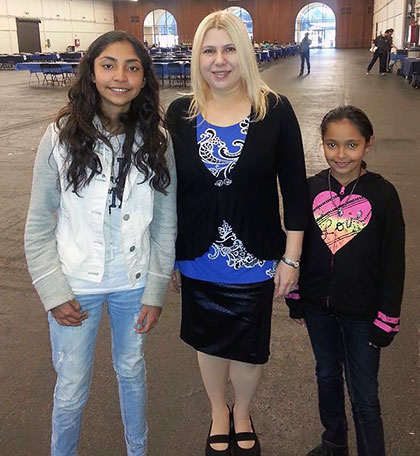
Sisters Alondra and Arely Raya at this year’s Polgar Championships in San Mateo, California
He is proud to point out that more than a half of his chess students are girls. As he says: ”In any given year the best player can be a boy or girl.” His success as educator as a chess coach has been noted by the science writer Dan Hurley who wrote a book called "Smarter: the New Science of Building Brain Power". Hurley interviewed one of Kevin’s ex-students for it and that story is in the introduction. Kevin sees chess as a way to give his students an opportunity to see the bigger world out there and then go on to become first generation college graduates.
Recently, Kevin set up his mind about making a drastic change in his life and, hopefully, in the life of impoverished children in Costa Rica. He believes that there is a big opportunity for chess to make a difference in Central America. He has three adopted children from Guatemala, so he had always had a place in his heart for that region.
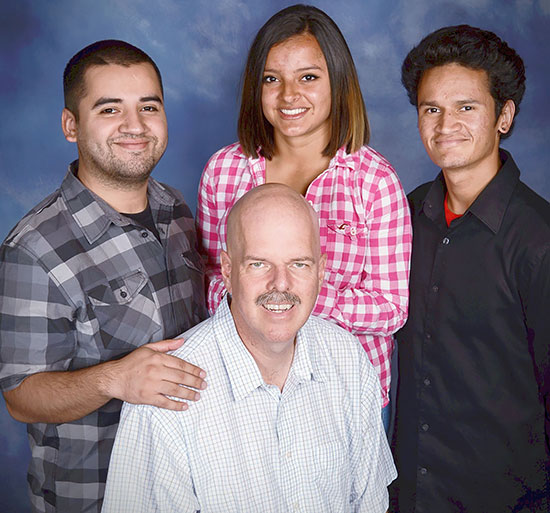
A recent photo of Kevin and his adopted, now adult, children from Guatemala
To realise this, he undertook some personal practical and financial sacrifices – he sold his house with the intention of living off the proceeds and took a year unpaid leave of absence. He has already been in touch and has the support of CEPIA, a non-profit organisation which gives food and clothing to the poor. They have programs for people with disabilities, adult literacy programs and also after school programs for children. They do an enormous amount of good in a place where nobody else does much for the poor.
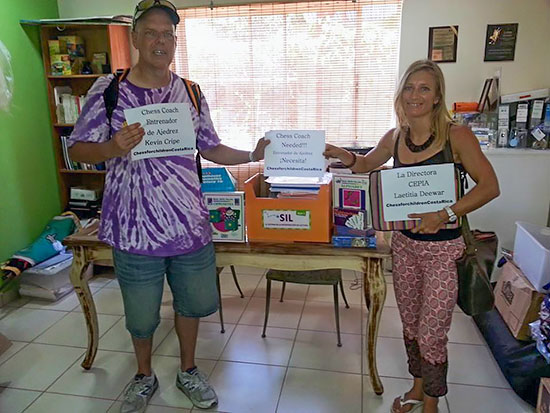
Kevin and the director of CEPIA, Laetitia Deewar
He also tries to raise additional funds. In order to understand the under core of the way he runs his fundraising, we need to know another important point about Kevin: he is a U2 freak. He knows their songs inside out, he does not miss a concert of theirs in his area and also further afield, and he often makes speeches in which he incorporates the titles of U2 songs.
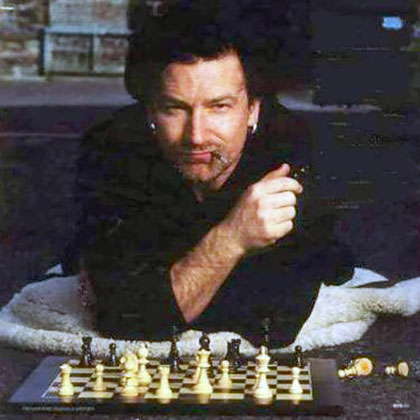
Bono plays chess
Kevin knows that Bono is a chess aficionado and it did occur to him to contact his idol and ask him for a contribution towards his chess in the poor communities project. As of now, Bono has remained silent, but let’s hope that he is not "So Cruel" and has just not replied yet.
In the meantime, Kevin is marching onwards with his own devices, once again making U2 his 'partner’. Kevin has been collecting posters of U2 concerts over the years. One of them, of the U2/Pearl Jam's 2006 Vertigo tour, is appraised for over $400. It is from the final stop on the tour and is in excellent condition. One lucky winner of the lottery that Kevin created for a cost of a $10 entry, will own this rare, valuable poster.

The poster for U2/Pearl Jam's 2006 Vertigo tour, appraised at over $400
All proceeds will benefit Chess For Children Costa Rica, one man's mission to create a chess program for underprivileged children in Costa Rica. Kevin Cripe will be travelling to Costa Rica to spend his time volunteering and providing lessons to teach children how to play chess. The chess program empowers these kids to believe in themselves, while teaching them valuable life skills like perseverance, patience, attention to detail and more.
Kevin also made a five-minute video explaining his method and goal.
Well doers somehow get to know each other, so Kevin came across another chess cause run by Jordi Mila Tejera, who had posted the following:
Search for chessboards, clocks, and chessbooks
We would like to supply chess sets in Housing, orphans and centres where young, jobless people use to go for enjoyment in Central African Republic (C.A.R). For this reason, the Chess Federation of the Central African Republic (C.A.R) is calling all those kind people having chessboards, clocks and chess books they do not use anymore to help by sending them to the address below:
The Federation of Chess in Central African Republic (C.A.R)
P.O BOX 511 Bangui - Central African Republic (C.A.R)
E-mail : centrafriquechess@gmail.com;
phone : +236 75 03 86 20 / +236 75 20 20 24
As it happens, Kevin’s late Aunt Mary was a missionary in the Central African Republic (then Empire). She would come back home every four years and bring her nephews wonderful gifts and told stories about the country. So, Kevin now joined forces with Mr Tejera and offered to donate 25% of whatever funds came his way in the next few days (that’s when his fundraiser for the poster ends). "I have always felt that good causes can work well together. My one thought was that a cause which helped children in poverty learn chess in both Africa and Central America would be something many would get behind."
Our readers would have noticed that 10 July, when the fundraiser for the poster ends, is very close. However, it should not be the end and funds will be welcome at any time, knowing that children and chess will benefit.
You can donate to the Chess for Chldren - Costa Rica fundraiser by clicking on this link